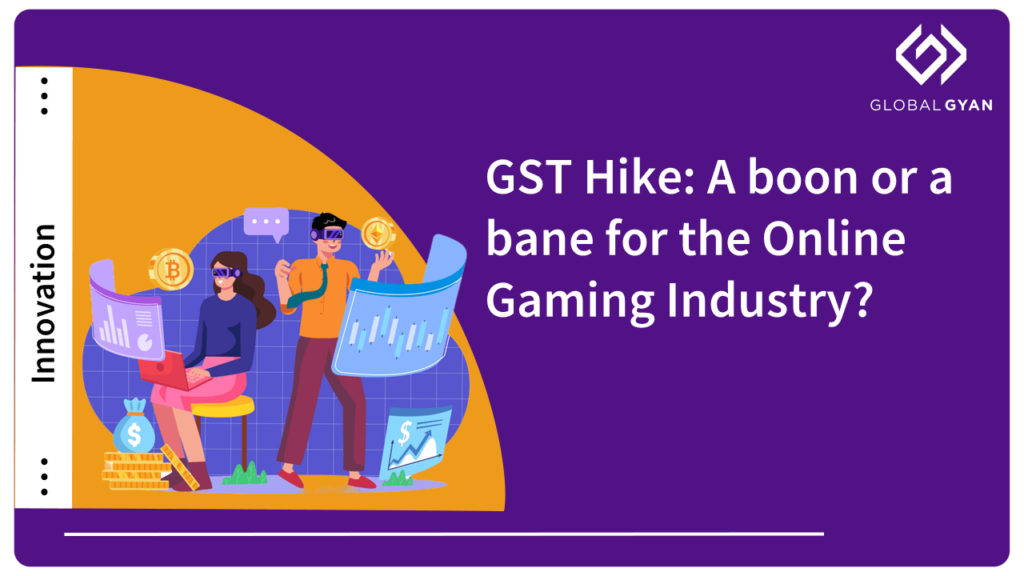The aftermath of tax hike on online gaming industry


20-year-old Ajay Kumar is a cricket enthusiast who has developed a penchant for betting on fantasy gaming applications. His father, Kartik, is a farmer with a monthly income of ₹20,000 to 25,000. Ajay is an avid follower of the Indian Premier League (IPL), one of cricket’s most profitable domestic tournaments, which is sponsored by some online gaming applications. Kartik believes that the advertisements aired during these matches are responsible for enticing his son into the world of fantasy gaming and betting. “During one of the commercial breaks, Ajay got swayed by an advertisement he saw and began using fantasy gaming applications to place bets on a daily basis”, said Kartik.
We can’t deny that similar headlines flood our Instagram feeds and newspapers day in and day out. Bets placed in online gaming fill the pocket of some while draining others.
In this article, we will cover:
Impact of GST Hike on Gaming Industry
The story so far…
Cricket is more than just a game in India. It’s a religion, a shared frenzy, a collective passion of the mass populace. So, when the Goods and Services Tax (GST) Council hurled a bouncer that could potentially blow the wickets of the online gaming industry, the uproar was both immediate and intense. The Goods and Services Tax (GST) Council, in its 50th meeting on Tuesday (July 11), decided to raise the tax rates on full face value for online gaming, horse racing, and casinos, from 18% to 28%. But the twist in the tale wasn’t merely this.
Shaking the field, even more, was the fact that the tax would no longer be confined to Gross Gaming Revenue (GGR) or the commissions earned by platforms like Games247, Dream11, etc. Now, the GST would be imposed directly on the Contest Entry Amount (CEA). That’s right, on every single rupee that passionate gamers deposit to participate!
Crazy, right?
If this googly has stumped you, don’t worry. Pull up a chair, because we’re going to make plain this curveball.
Previously, the country’s 900+ gaming start-ups were only paying a small tax on the fees for offering these fantasy games.
Online gaming companies were required to pay the government an 18% GST on the Gross Gaming Revenue (GGR) or the platform fee, in addition to a 30% TDS on the winnings. Up until now, online gamers and poker players had not been impacted by any additional GST levied on the value of bets placed, except for the small platform fee collected by the respective gaming companies.
However, with the imposition of a 28% GST on the entire value chain that encompasses a gaming transaction, all the money collected from players will now be subject to taxation.
So, let’s put it this way.
Under the new norms, a gamer is required to pay a whopping 28% GST on the total amount deposited to play a game, in addition to the platform fee and 30% TDS on net winnings.
How will this impact the incumbent companies?
The new GST norms have been met with criticism from online gaming companies, who claim that their ability to invest in new games, cash flows, and business expansion will be hindered. The fantasy gaming industry, which was projected to generate revenues of over ₹25,240 crore by 2027, will suffer a significant blow.
Safe to say, these gaming companies and the so-called associations blanketing them won’t stay put!
The All-India Gaming Federation (AIGF), representing firms such as Winzo, Zupee, GamesKraft, and Nazara, has condemned the decision as unconstitutional, irrational, and outrageous. AIGF CEO Roland Landers stated that the decision disregards more than 60 years of established legal precedent by equating online skill gaming with gambling activities. “This decision will decimate the entire Indian gaming industry, resulting in the loss of lakhs of jobs. The only beneficiaries will be illegal offshore platforms”, he said.
Ashneer Grover, the co-founder of BharatPe and recent founder of the fantasy gaming company CrickPe, has strongly criticised the government’s decision. According to Grover, this decision will destroy the fantasy gaming industry. He believes that it is time for entrepreneurs to become involved in politics, or else the government will continue to make similar decisions that may kill such industries.
Whereas, the Internet and Mobile Association of India (IAMAI) argues that online gaming is unlike gambling and betting and that taxing it along the lines of gambling activities could severely harm a lucrative industry.
Now, was this a means to discourage online games involving gambling and betting?
The big question: Why this decision?
Well, one can speculate that ‘sinful’ activities and products like gambling and cigarettes attract the highest tax rates.
However, with online gaming, one needs to understand the nuances—is it a game of skill or mere luck?
The prevailing legislation strictly prohibits any form of gambling in the country, with exceptions made for certain skill-intensive games such as chess, dominoes, etc. It is worth mentioning here that the advertisements for these niche enterprises can be misleading, often creating an illusion of huge winnings, while the majority of the participants gain minimal returns (remember the hero of our case study, Ajay?).
Professionals say that when a game is categorised as a skill-based game, i.e. a game that requires the player to be proficient in a particular skill, its algorithm is designed to control the whole gameplay. This control is mapped in a manner that ensures the company’s profit outweighs players’ winnings. Moreover, a skill-based game demands analytical understanding, statistical know-how, and data research. Decisions made purely on speculation cannot be classified as skillful.
In the Indian context, games that require a significant degree of skill can be legally played for monetary benefits without being labeled as gambling. Nevertheless, the lack of a consistent legal framework across all states has led to complexities being introduced in regulating local fantasy gaming apps.
As it stands, certain states have legitimised and regulated online gaming, while others have unequivocally outlawed it.
But, amidst this backlash, the government had to respond with something.
Finance Minister Nirmala Sitharaman announced the decision late on Tuesday, stating that the GST council, which is made up of federal and state finance ministers, does not want to “kill an industry”. However, she added that the industry could not be encouraged at the expense of essential goods and services.
Siddhartha Iyer, a Supreme Court lawyer who has been advocating for a ban on online gaming, told the BBC that the 28% tax is a “step in the right direction”. He referred to online gaming as a “speculative activity” and believes that the government’s view of these games as ‘gambling’ is correct because players are wagering on something outside of their control.
We’re sorry to burst the bubble but there is some truth in Mr.Iyer’s comments.
He likened the taxation of online gaming to that of alcohol and cigarettes, noting that the higher tax slab on the latter was administered with a view to discourage their use. He told the BBC that fantasy gaming is an addiction that affects children and teenagers and called for stricter restrictions based on age and income.
Final Thoughts
According to the sources, there is a disagreement between the Finance Ministry and the Ministry of Electronics and Information Technology (MeitY) over the GST Council’s decision to impose a 28% GST on the full-face value.
Prominent investors, such as Peak XV Capital, Tiger Global, DST Global, Bennett, Coleman & Company Limited, Alpha Wave Global, Chrys Capital, and Lumikai have written letters to the Prime Minister, urging him to intervene in the GST Council’s decision, looks like people in power have left no stones unturned.
So, this calls for a review meeting, doesn’t it?
While companies in this sector are seeking clarity and potentially a review of the decision made by the GST Council. The Ministry of Electronics and Information Technology (MeitY) believes such decisions can impact the startups in this sector severely, which is why the review must consider the other side of the coin as well.
It seems the fate of the online gaming industry is left to the government’s discretion, that the previous tax slab will be retained, or the revised 28% GST slab be levied on the gross revenue.
But this ball game surely leaves several questions unanswered like:
- Did the government just ignore the 60+ years of settled legal jurisprudence and lump online skill gaming with gambling activities?
- The GST council seems convinced about the revised tax rates. Will provisions be made in favour of online gaming companies?
- Or is the moral talk just a cover for a larger chunk of this floating ice?
At the moment, uncertainty looms large for those in the fantasy gaming industry.


